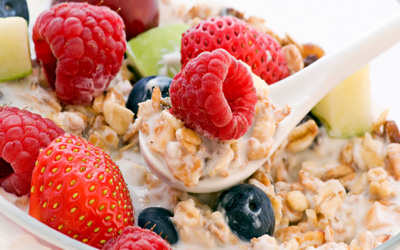



Over half of the respondents to a recent Student Health 101 survey said they make the effort to eat breakfast every day. And according to the old adage, “Breakfast is the most important meal of the day,” these students are on the right track.
But do you know why breakfast is so important? Read on to learn the reasons and how to make the most of your first meal of the day.
Everything can feel a little fuzzy and difficult if you haven’t eaten breakfast. Susan Somerville, Registered Dietitian and Program Coordinator of Food and Nutrition Management at Humber Institute of Technology and Advanced Learning in Toronto, Ontario, says, “Blood glucose levels are low in the morning, and for your body and brain to work effectively, they need a source of energy to kick-start your day.”
In 2008, the Toronto District School Board partnered with the Toronto Foundation for Student Success in implementing the Feeding Our Future program, which provided middle and secondary students at participating schools with a free breakfast. The evaluation revealed that students who ate breakfast exhibited improvements in behaviour, attitude, and the ability to stay on task. Additionally, secondary students who ate more consistently in the morning were more likely to be on track for graduation than those who skipped breakfast.
Why does breakfast affect your ability to succeed in the classroom? Your brain needs calories in order to function. Emilie T., a graduate of the School of Nutrition at Ryerson University in Toronto, Ontario, now works as a dietetic intern and is very familiar with the impact of nutrition on capabilities. As she explains, “Your brain consumes 20 percent of your daily calories. That’s pretty significant for one organ. So being malnourished affects first cognition, and secondly, the rest of your body.”

In a recent study looking at students’ breakfast-eating habits, stress levels, and ability to handle problems, San Francisco State University researchers found that students who skipped breakfast felt less capable of problem solving than students who had eaten soon after starting their days. “Stress levels were related to breakfast consumption patterns over time,” the researchers noted.
But the power of breakfast isn’t only studied in science labs. Students can easily see the difference in the lab of life, too. Irvin A., a student and personal trainer at the University of Windsor in Ontario, notes, “When I fail to eat breakfast, I lack concentration. It can alter my mood in a negative way.”
In the rush of the morning, it might seem like breakfast takes too long to make or is awkward to eat in your dorm room or car. But by trading in 15 minutes of sleep for a simple piece of toast or some eggs, you can increase your energy levels and feel better throughout the day. Jolene P., a student at St. Clair College in Windsor, Ontario, says, “I always make sure to plan an extra 15 minutes in my morning routine to make breakfast. It’s always something simple-a bagel, toast, or cereal. When I eat breakfast, I can concentrate more.”
Breakfast doesn’t have to be an enormous time commitment. In fact, most students spend between 5 and 10 minutes preparing breakfast. Some study, read the news, or get ready for the day while they eat.

You only need a few simple ingredients to put together a healthy morning meal, and although storage and other appliances might be limited, breakfast foods are often easy to keep on hand. Somerville suggests that students stock up on low-sugar granola bars or high-fibre breakfast cereals, as well as protein sources.
“The brain works most efficiently on a fuel of carbohydrates, so make sure you consume some good sources of multi-grain, high-fibre cereals or breads along with some protein for maintenance of blood glucose levels,” she explains.
Emilie agrees, “When you eat refined carbohydrates, it promotes serotonin synthesis, a sense of well-being, and higher levels of insulin, but these also promote sleepiness. You can combat this by eating lean protein along with carbs.”
What about if you’re eating at a cafeteria or elsewhere on the go? Maybe you assume healthy options aren’t available, so you skip breakfast altogether. If you look carefully, though, you’re likely to find some good choices.
“Excellent on-campus choices for breakfast include whole-grain toast with nut butter (peanut, almond, or cashew for variety), whole-grain cereals with low-fat milk and fruit on top, or high-protein Greek-style yogurt sprinkled with granola and berries. Try to choose unsweetened cereals and yogurts, and add your own fruit or a bit of honey or maple syrup,” Somerville suggests.
Plus, as she points out, “They are already prepared and ready, so all you have to do is grab and go.”
So whether you’re eating at home or on the go, take a few minutes for breakfast. Your brain and body will thank you by working their best.
Rick is a convergence reporter and is enrolled in his third year of Journalism at the St. Clair Mediaplex.
Rob Reneau, Sous Chef of Michael’s Table in Perth, Ontario, shares his ideas on creating an easy and healthy breakfast. He says, “Switch up the ingredients, be creative, don’t get into a rut, and prepare things in advance.”
Susan Somerville, Registered Dietitian and Program Coordinator of Food and Nutrition Management at Humber Institute of Technology and Advanced Learning in Toronto, Ontario, also suggests experimenting with recipes for homemade granola bars or healthy muffins.
She says, “Bake some muffins using canola oil or non-hydrogenated margarine, whole-wheat flour, ground flax, and plenty of fruit. These will be healthy, tasty muffins.”
Also try:
Even if you’re really in a hurry, grab something like a granola or nut and fruit bar. Look for those with 200-300 calories that are low in sugar, high in fibre, and made from as many whole ingredients as possible.
Here are some healthy foods to seek out when you’re on the go:
Remember, you can always get a few things á la carte and put them together as a custom meal.




